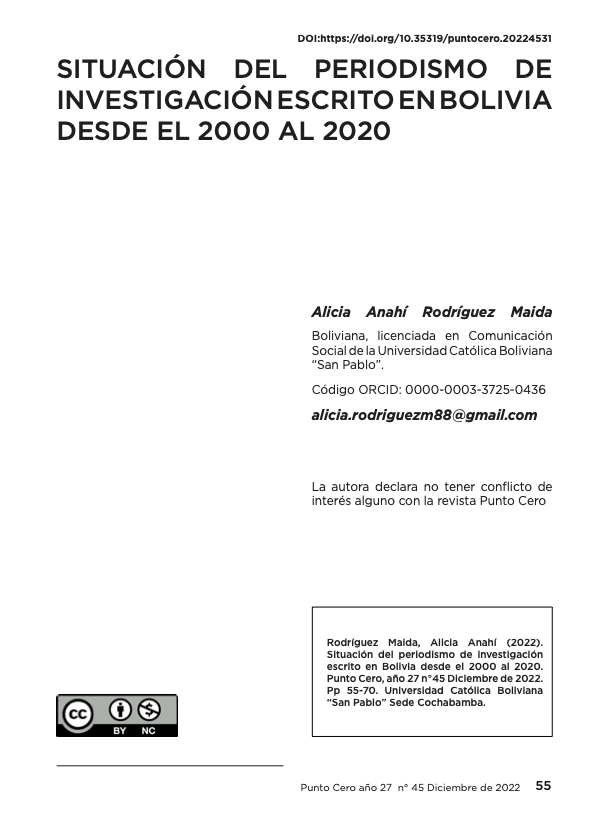Situation of written Investigative Journalism in Bolivia from the year 2000 to 2020
DOI:
https://doi.org/10.35319/puntocero.20224531Keywords:
Investigative Journalism, Information, Hidden Facts, Processes, TransparencyAbstract
This research shows information on the situation of written investigative journalism (IJ) in the central axis of Bolivia from 2000 to 2020. This branch of journalism is relegated by conjuncture journalism and is often confused with related areas, such as in-depth journalism or data journalism. On the other hand, there are no investigations related to written IJ in the Bolivian context that cover a similar journey. The main aim of this research is to determine the situation of investigative journalism in the time and space previously specified. In this sense, a constructionofareferentialframework and a theoretical base is proposed, in order to analyze later the results obtained through interviews, focus groups and complement with data on the foun products. Consequently, similarities and differences between the international context and theory with the reality of investigative journalism in Bolivia are made visible. Also, adaptations made by journalists are evident regarding the process of perform this type of journalism and points of view on collaborative, cross- border, independent or mixed work.
References
Ayala E., A. (2013). Inserción del periodis- mo de investigación en canal 13 televisión universitaria para la formación pre-profesional de los estudiantes de comunicación social. https://repositorio.umsa.bo/bitstream/handle/123456789/24666/PG-563.pdf?sequence=1&isAllowed=y
De Pablos C., J. M. (1998). Periodismo de investigación: las cinco fases P. Revista Latina de Comunicación Social, 09(99– 110), 12.
Fundación para el Periodismo. (2021). Treinta periodistas de Bolivia se capa- citan en periodismo de investigación. https://fundacionperiodismo.org/trein-ta-periodistas-de-bolivia-se-capaci-tan-en-periodismo-de-investigacion/
Gastélum, R. G., & Coronel C., A. I. (2009). Periodismo de Investigación: Una mirada desde la realidad. 91.
Gilanraz Palancar, P. (2017). Periodismo de investigación y cámara oculta. Ética, licitud y límites. https://eprints.ucm.es/42346/1/T38704.pdf
Hernández S., R. (2014). Metodología de la Investigación (E. Interamericana (ed.)). Mc Graw Hill. http://marefateadyan.nas-hriyat.ir/node/150
Lagos, C. (2014). Apuntes sobre Periodis- mo de Investigación en el Cono Sur. Co- municación y Medios, 0(28), 5–23. https://doi.org/10.5354/0716-3991.2013.27445 DOI: https://doi.org/10.5354/0716-3991.2013.27445
Nazakat, S., & Programa de medios de Comunicación de la KAS para Asia. (2018). Periodismo de investigación, portavoz ciudadano. Fundación Konrad Adenanuer.
Petrone, F. (2009). Estudio de agenda setting: Conceptos , metodología y bor- dajes posibles. V Jornadas de Jóvenes Investigadores. Instituto de Investigacio- nes Gino Germani, Facultad de Ciencias Sociales, Universidad de Buenos Aires, Buenos Aires, 2009., 0–18. https://www.aacademica.org/000-089/234.pdf
Strauss, A., & Corbin, J. (2002). Bases de la investigación cualitativa: técnicas y procedimientos para desarrollar la teoría fundamentada. Imprenta Universidad de Antioquía. http://www.academia.edu/download/38537364/Teoria_Fun-damentada.pdf

Downloads
Published
How to Cite
Issue
Section
License
Copyright (c) 2022 Revista Punto Cero

This work is licensed under a Creative Commons Attribution-NonCommercial 4.0 International License.








